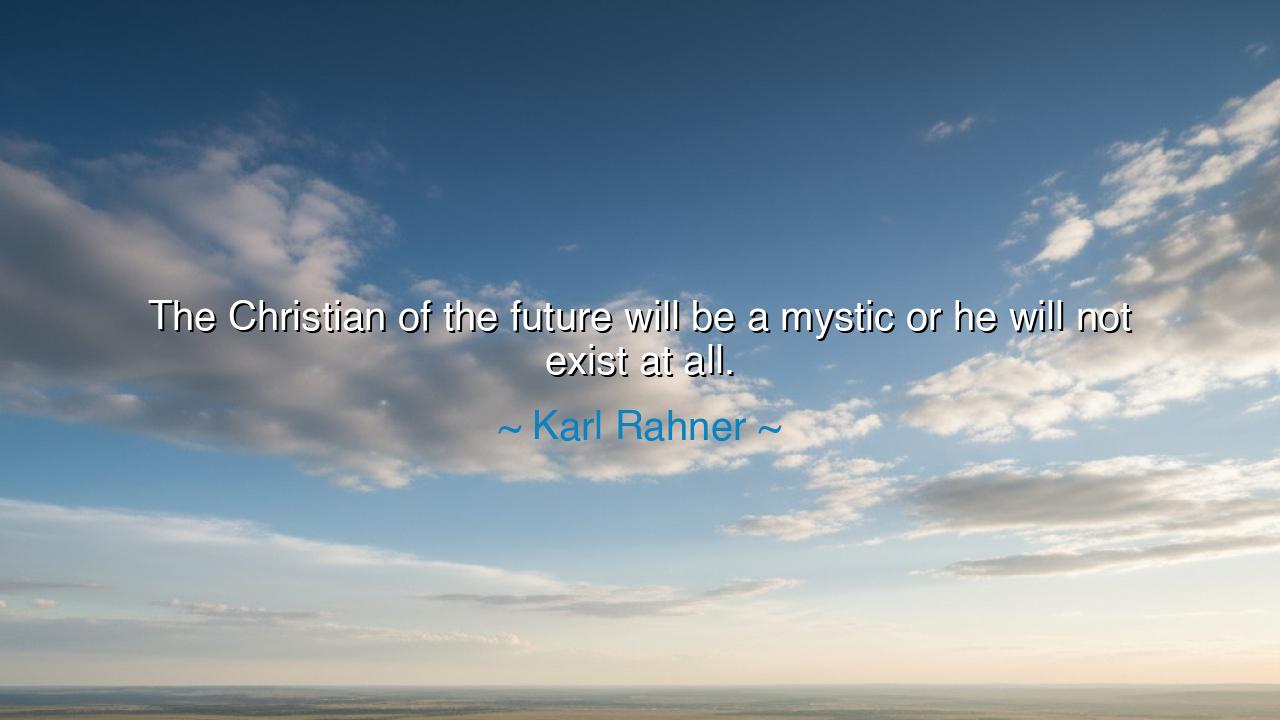
The Christian of the future will be a mystic or he will not exist






"The Christian of the future will be a mystic or he will not exist at all." These powerful words from Karl Rahner speak to the evolving nature of faith, spirituality, and religious experience. Rahner’s statement suggests that in an age increasingly defined by materialism, technology, and skepticism, the traditional forms of religious practice may no longer hold the same significance or draw the same depth of connection. Instead, he proposes that the future of Christianity will hinge upon the mystical—the personal, deep, and transcendent experience of the divine that goes beyond ritual and doctrine. The mystic, in this context, is someone who directly engages with the divine presence, experiencing God not as an abstract idea but as a living reality in their daily life.
In the ancient world, mysticism was often viewed as a form of direct communion with the divine, where the soul transcended the ordinary and entered a deeper state of awareness. The Greeks had their Oracles, and the Egyptians had their mysteries—rituals through which individuals could experience a closer union with the gods. This concept of mystical union was seen not just as an intellectual pursuit but as a personal transformation, a way to experience the divine in an intimate, life-altering way. Just as Plato sought to elevate the soul through philosophical inquiry, so too did the mystics of various traditions seek to lift the spirit to a higher plane of awareness. Rahner’s assertion that Christianity must evolve toward a mystical experience mirrors the ancient understanding that true spirituality is not confined to external actions but is a matter of the inner life.
The life of Saint Francis of Assisi, one of the most revered mystics in Christian tradition, illustrates Rahner’s vision. Francis did not find his relationship with God in theological debates or societal structures but through direct experiences of poverty, simplicity, and a deep connection to the natural world. Francis is said to have experienced visions, felt a deep connection to the suffering of Christ, and, in his mystical union with the divine, became a living embodiment of Christ’s love and compassion. Like Rahner’s Christian mystic, Francis transcended the outward forms of religion and found his faith in personal, lived experience. His mystical vision transformed the way the world understood Christian spirituality, emphasizing direct communion with the divine over ritual and law.
The Reformation brought a shift in Christian practices, focusing on the importance of scripture and doctrine, but it also resulted in a divide between personal experience and the institutional church. Martin Luther, while advocating for a return to the original texts of the Bible, also had moments of deep mystical experiences in which he felt personally connected to the divine. Luther’s transformation was as much about internal experience as it was about doctrinal reform. Rahner’s quote suggests that the mystical experience that Luther sought within his own spirituality may be the necessary way forward for modern Christians, particularly as society moves away from organized institutional religion toward more individualized forms of spirituality.
Consider the rise of contemplative traditions in modern Christianity, which emphasize personal prayer, meditation, and a direct relationship with God. In a world where religious rituals and structures often feel disconnected from the realities of daily life, many find that it is only through mystical experience that they can encounter the divine in a deeply meaningful way. Figures like Thomas Merton, a modern Christian mystic, championed this path of solitude and silent contemplation, where the individual could encounter God through quiet reflection and inner transformation. Merton’s teachings echoed Rahner’s point that spirituality in the future would need to evolve into something more deeply personal and experiential, where one’s direct connection to the divine would be the guiding force.
The lesson Rahner imparts is crucial for our own time: faith is not merely a matter of external observance or following a set of prescribed beliefs; it is about a deep, personal connection to the divine that transcends ritual and tradition. In a world that increasingly feels disconnected from the spiritual and the transcendent, the call for a more mystical faith—one that invites individuals into a direct, transformative experience of God’s presence—becomes all the more urgent. The future of Christianity, according to Rahner, will be rooted not in adherence to an outdated system of belief but in the ability to experience the divine directly, in a deeply personal, intimate way.
Let us take action by seeking to deepen our own spiritual experience. Like the great mystics of the past, we must learn to cultivate a personal relationship with the divine that goes beyond external forms and rituals. Whether through meditation, prayer, or reflection on the natural world, we are called to seek the mystical—the inner experience of God that transcends words and structures. In doing so, we not only deepen our own faith but ensure that the future of spirituality is rooted in an authentic and deeply personal connection to the divine. As Rahner’s words remind us, in a world that is increasingly skeptical and disconnected from traditional religious practices, the mystical experience is the path forward, for it is through this direct communion that we truly encounter the divine.






AAdministratorAdministrator
Welcome, honored guests. Please leave a comment, we will respond soon